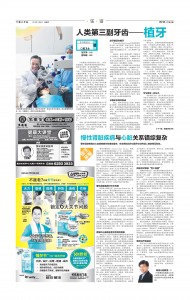 This article first appeared in the January 8th, 2015 issue of Lianhe Zaobao LOHAS. For the benefit of those who missed the article, or who cannot access the publication in Chinese, we have summarized the content of the article below.
This article first appeared in the January 8th, 2015 issue of Lianhe Zaobao LOHAS. For the benefit of those who missed the article, or who cannot access the publication in Chinese, we have summarized the content of the article below.
Dr Neo Tee Khin, dental specialist in prosthodontics at Specialist Dental Group® akins human’s teeth to car tyres; both wear and tear with age and the frequency of use, and will only get worse with time.
Dr Neo said that no matter how much one tries takes care of his teeth, even with no cavities and missing teeth, one’s teeth will experience some wear and tear and cracks. However, with the use of modern technology in dentistry, it is definitely possible to restore teeth that have been used for years to the aesthetics and functional state of a 20 year old’s teeth. This also has the additional benefit of promoting one’s oral health and overall wellbeing.
He pointed out that a lot of elderly with cavities and missing teeth do not receive appropriate dental treatment. As such, their ability to chew food is greatly compromised and as a result, they do not get sufficient nutrients and do not have a balanced diet. In the long term, their emotional and physical health suffers.
“We need to change the perceptions of many elderly towards their oral health and encourage them to restore function to their teeth. The newest dental implant technology is not complicated. In fact, it does not cause bleeding, swelling or pain, and is absolutely reliable.”
Dr Neo Tee Khin said that with dental implants, the ability to chew far exceeds that of traditional dentures. Implants are strong and stable; they are rooted inside the patient’s mouth like natural teeth and will not compromise the two neighbouring teeth.
“Dental implants do not need support pieces and hooks that removable dentures require. Without the large piece of plastic support, common complaints that denture wearers have of discomfort and a dulled sense of taste will cease. Implants are small and have no exposed metal; hence they are an aesthetic and hygienic solution.”
Dr Neo said that the minimal age to consider dental implants should be 16 years old, where one’s jaw bones are fully developed. There is no upper age limit for dental implants, and Dr Neo shares that he has a dental implant patient who is 92 years old. However, he also half-jokingly advised for the elderly not to wait until 99 years old to have their dental implants done.
Dental Implants Are Suitable For All With Missing Teeth
Dr Neo Tee Khin said that dental implants have been used as a solution for missing teeth for more than 50 years with a clinical success rate as high as 97%. The oral medical profession has widely accepted dental implants as the top restorative solution for missing teeth, hence the moniker ‘human’s third set of teeth’.
Dr Neo pointed out that dental implants are suitable for people with missing teeth, no matter if it is one missing tooth, several missing teeth or even completely toothless (edentulous). A single dental implant does not compromise the neighboring healthy teeth; implants made for several missing teeth or even a completely toothless jaw will satisfy both the aesthetic and functional aspects in a dental examination.
He added, people who are missing teeth for an extended period of time will experience their alveolar bone receding to varying degrees. When this happens, dentures with hooks and suction pieces will become loose and one will experience poor retention powers and reduced chewing abilities. For these cases, implant-supported dentures will be an appropriate solution to enable the denture piece to be stable, returning normal chewing capabilities.
Additionally, he also pointed out that as the suction piece and hooks are secured on top of healthy neighboring teeth; these adjacent teeth will have to bear some of the biting force exerted on the dentures. In time, these healthy teeth will suffer. However, dental implants do not have such issues.
Dr Neo suggests for elderly who have been wearing entire sets of dentures for a long time to opt for implant supported dentures on their lower jaws. This method will allow their dentures support and their chewing abilities will not be affected by loose dentures anymore.
Titanium Dental Implants
So, what is a dental implant? Dr Neo explained that dental implants do not use real teeth. A dental implant is a titanium screw manufactured to mimic the shape of a person’s dental root. This implant is inserted into the missing tooth site by a minor surgical procedure.
“About two months later, when the dental implant has integrated into the jaw bone, a dental crown will be placed.”
Dr Neo said that crowns can be made according to patient’s requests, and a variety of options which include ceramic and polymer materials can be used. The materials used in implants are strictly regulated and currently the most common materials used are titanium or titanium gold as base.
Research has shown that titanium is resistant to wear and corrosion. The surface of the titanium reacts with air to form an oxidized layer which is inert at a room temperature; similar to the nature of human bones. It is said that during an animal experiment, scientists stumbled upon the accidental discovery that titanium can fuse naturally with bones. Not only is titanium biocompatible, it does not contain toxics and has no side effects; it is non-magnetic and causes no irritation. In the moist body environment it remains inert and it does not react easily with organic matter.
Before placing a dental implant, the dentist will examine the patient’s medical history and current health status by going through a systemic and oral examination, such as taking panoramic dental X-rays to find out the density and amount of the bone left in the edentulous part of the jaw. Blood pressure will also be taken prior to further treatment.
Dr Neo said that with the advancement of technology today, what used to take a week (to fabricate a tooth) now only requires two hours, with the aid of three dimensional digital technologies.
However, he added that for patients with missing teeth for a prolonged period of time, the alveolar bone will recede and bone grafting may be required. Bone graft material would be placed underneath the gums, before stitching the gums back to allow it to fuse with natural bone. As such, the healing period for dental implants can take between four to six months. Bone grafting materials can be harvested from one’s own bones, or processed bone substitute materials from the United States.
Dental Implants Can Last as Long as Your Natural Teeth
Dr Neo Tee Khin said that the connection that dental implants form with one’s gums is similar to that of natural teeth and its gums; patients with dental implants should care for their implants as they would their natural teeth for long term stability. Dental implants can develop tartar and plaque, so it is advisable to maintain them like natural teeth, which include brushing once in the morning and once at night to ensure hygiene in your oral cavity.
Research has shown that, when one chews on too much hard foods, dental implants wear and tear just like natural teeth. Therefore, one should refrain from excessive biting and nibbling on nuts and seeds, and other bad dental habits. Dr Neo said, “As long as you maintain oral hygiene, heed your dentist’s advice and schedule for regular dental check-ups, dental implants can last as long as your natural teeth.”
Dr Neo Tee Khin is a Dental Specialist in Prosthodontics with Specialist Dental Group®, Singapore. He is also an Adjunct Senior Lecturer with the National University of Singapore and a Consultant at the National University Hospital. He is a Diplomate of the American Board of Prosthodontics. Dr Neo has a special interest in dental implants, crowns and aesthetic dentistry. For more information, visit www.specialistdentalgroup.com.
Source: © Singapore Press Holdings Limited. Reproduced with permission






